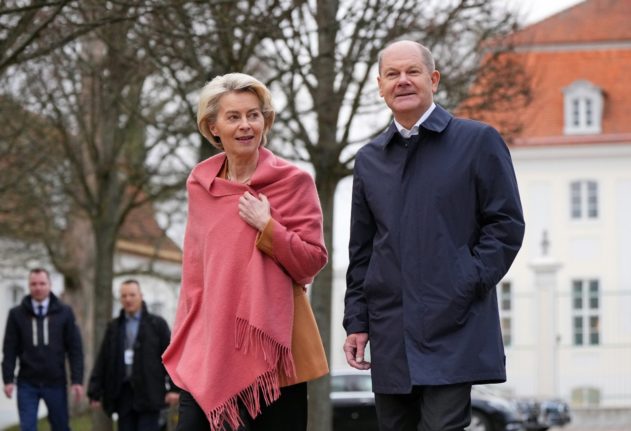France-Germany row overshadows EU leaders’ summit
Existing strains deepened between the European Union’s two biggest players after Berlin upset some of its partners by blocking — at the last minute — a landmark deal to prohibit new sales of fossil fuel cars from 2035.
The ban is key to Brussels’ ambitious plan to become a “climate neutral” economy by 2050, with net-zero greenhouse gas emissions.
In an unprecedented move this month, Germany intervened after the car ban had already been approved under the EU legislative process.
It demanded that Brussels provide assurances the law would allow the sales of new cars with combustion engines that run on synthetic fuels.
Advertisement
While the last-minute block frustrated France, Paris has in turn irked Berlin by insisting on giving nuclear energy greater prominence in EU proposals to produce more green technology in Europe.
Paris and Berlin have traditionally worked together to push forward the EU agenda.
The European Commission, the EU’s executive arm, has been holding talks with Germany’s transport ministry to resolve the dispute over cars.
After the summit ended late Thursday, commission chief Ursula von der Leyen sounded an optimistic note about the negotiations that were “progressing”, but added the issue was not raised during the leaders’ talks.
“There is the will on both sides to resolve this topic, and to resolve it within the scope of the provisional agreement,” von der Leyen told a press conference.
German Chancellor Olaf Scholz told reporters before the summit that talks were “on the right track”.
“It is now really only a matter of finding the right way to implement this promise,” Scholz said.
READ ALSO: OPINION: The Franco-German ‘couple’ is crucial to the EU but the relationship is in trouble
Pressure on Germany
Some leaders criticised Germany’s 11th-hour move to slam the brakes on a proposal that had already cleared all the hurdles in the traditional EU legislative process.
“The entire architecture of decision-making would fall apart if we all did that,” Latvian Prime Minister Arturs Krisjanis Karins said.
“We cannot go back on deals because this is ultimately about trust between co-legislators and the credibility of the legislative process,” said European Parliament President Roberta Metsola.
Germany, which boasts one of the world’s biggest car manufacturing industries, blocked the deal signed last year in a move viewed as a product of domestic politics.

EU Commission President Ursula von der Leyen and Chancellor Olaf Scholz walk to a press conference in Gransee, Brandenburg. Photo: picture alliance/dpa | Soeren Stache
Scholz heads a coalition made up of his social democrats and rival Greens and liberals.
The synthetic fuels Germany wants an exemption for are still under development, produced using low-carbon electricity. The technology is unproven, but German manufacturers hope it will lead to the extended use of combustion engines.
While Germany led the revolt against the combustion engine ban, it is not alone. It has formed a small alliance with countries including Italy, another major car manufacturer, and eastern European states such as Poland and Hungary.
France has not held back from publicly criticising Germany.
Against this tense backdrop, French President Emmanuel Macron will meet Scholz one-on-one Friday.
France’s nuclear affair
Another bone of contention they will have to thrash out is France’s push for EU recognition that nuclear power has a role to play in Europe’s green future.
The commission last week launched new plans to boost clean technology production by ensuring permits are issued faster and projects given better access to funding.
Von der Leyen acknowledged that “nuclear can play a role in our decarbonisation efforts” but said only “cutting edge nuclear” would have “access to some simplified rules and incentives”.
Advertisement
Nuclear-powered France wanted atomic energy to be included in the list but, while it failed to achieve that goal, it won a small victory.
Nuclear did feature in the proposals announced but the plans only apply to fourth-generation reactors that do not yet exist, meaning atomic energy would obtain little of the advantages on offer.
Nuclear divides the EU, with countries like Austria and Luxembourg strongly against while its supporters include the Czech Republic and Poland.
“It’s not safe, it’s not fast, it’s not cheap and it’s not climate-friendly. With European flags on it, it would be a scam,” Luxembourg’s Prime Minister Xavier Bettel said.
READ ALSO: Germany and France scrap parliamentary talks amid friction
By Raziye Akkoc and Julien Girault
